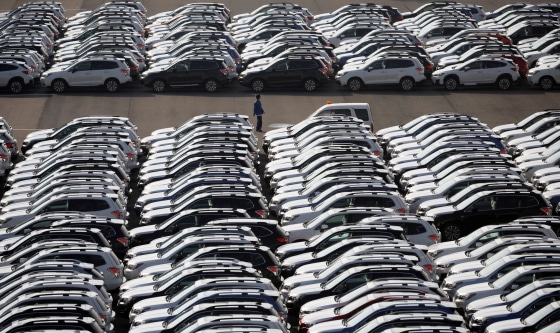President Donald Trump's threats to slap substantial new tariffs on automotive imports could “undermine the multilateral trade system and disrupt the order of international trade,” China's commerce secretary said on Thursday.
The president has long expressed his frustration about automotive imports, raising the threat of a “substantial border tax” targeting automakers like Ford for increasing the number of vehicles they bring in from Mexico — but the latest threat has taken an unexpected turn.
To avoid having to negotiate new tariffs with Congress, Trump wants Commerce Secretary Wilbur Ross to investigate whether auto imports are a threat to national security, something he could act on unilaterally under Section 232 of the Trade Expansion Act of 1962.
On Wednesday, the president signaled in a tweet that there will be “big news coming soon for our great American autoworkers.” Hours later, the White House issued a terse statement announcing the auto imports investigation, with Trump declaring, "Core industries such as automobiles and automotive parts are critical to our strength as a nation.”
Exactly what the White House might have in mind is uncertain, though reports quickly begin circulating, citing unnamed administration sources, that tariffs on auto imports could jump as high as 25 percent. That would be a tenfold increase on the 2.5 percent duties currently in place — with the exception of the 25 percent “chicken tax” on imported pickup trucks that is a holdover of a decades-old trade dispute with Europe over American poultry.
Ironically, the possibility is there that the U.S. could soon match the duties currently imposed by China on auto imports, even though Beijing announced this week it would drop the tariff on imported autos to 15 percent by July 1.
During a "Talks at GS" conversation with Goldman Sachs Chairman and CEO Lloyd Blankfein, GM CEO Mary Barra said that she would either see auto tariffs eliminated around the world or set at an even level in all markets.
"If you give us a level playing field, we want to compete and we want to win based on merit," Barra said Wednesday. “There's opportunity there to create a level playing field, which we don't have today."
Detroit automakers are perhaps the most likely to benefit from any new tariffs — at least if it doesn’t shake up the economy and lead to lower demand in a market that last year slipped to 17.2 million vehicles, the first downturn since the end of the Great Recession.
One of the concerns held by tariff supporters and opponents is that vehicle prices could rise at a time of weakening demand. "The thing in the auto industry that you always have to look at is if someone can't afford a new car, they'll buy a used car. And if they buy a 5-year-old or a 10-year-old” vehicle, Barra said.
Earlier talk of tariff increases were scuttled under pressure from the auto industry and, in particular, car dealers. Foreign automakers, who already have invested tens of billions of dollars in U.S. plants, were also voicing opposition.
John Bozzella, CEO of Global Automakers, which represents foreign automakers doing business in the U.S. and some domestic parts suppliers, criticized the latest threat, calling it “a bad day for American consumers.”
"The U.S. auto industry is thriving and growing. Thirteen, soon to be 14 companies, produced nearly 12 million cars and trucks in America last year,” Bozzella said, referencing the soon-to-open Volvo plant in South Carolina. “To our knowledge, no one is asking for this protection. This path leads inevitably to fewer choices and higher prices for cars and trucks in America.”
Exactly how the latest move by Trump will play out is uncertain. Specific plans haven’t been announced, though Dave Cole, director-emeritus of the Center for Automotive Research, said that’s no surprise. “It’s his bargaining style. He never puts anything out where he wants to end up.”
Cole said the tariff hike clearly is aimed at Trump’s “autoworker base, but while it is clearly “a provocative move,” it’s likely far too early to see if it will result in more American auto investments and jobs.
